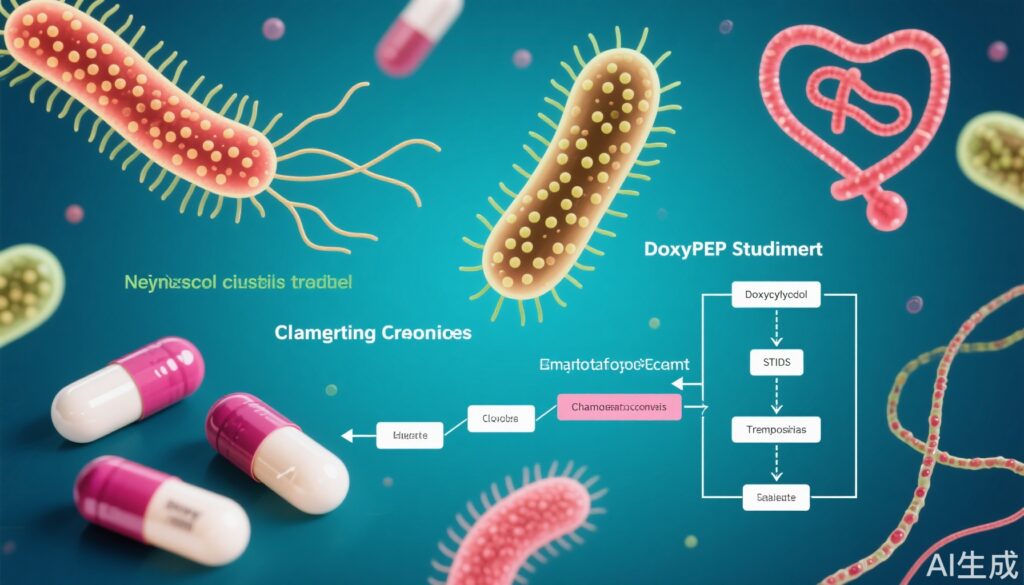Highlight
The DoxyPEP multicentre, open-label randomised controlled trial in Seattle and San Francisco demonstrated a 61% relative reduction in bacterial STI incidence among men who have sex with men (MSM) and transgender women using doxycycline post-exposure prophylaxis (doxy-PEP). Doxy-PEP was well tolerated with minimal adverse events and did not significantly increase tetracycline resistance in Neisseria gonorrhoeae isolates during the study period. These findings support doxy-PEP as an effective strategy to prevent bacterial STIs in high-risk populations.
Clinical Background and Disease Burden
Bacterial sexually transmitted infections (STIs) such as gonorrhoea, chlamydia, and syphilis continue to impose a significant public health burden in the USA, particularly among men who have sex with men and transgender women. Rising incidence rates and associated complications underscore the urgent need for effective prevention strategies. Post-exposure prophylaxis (PEP) with doxycycline, an antibiotic with proven efficacy against common bacterial STI pathogens, has emerged as a promising intervention to reduce STI acquisition following condomless sex. However, concerns about antimicrobial resistance and long-term safety have limited widespread adoption.
Research Methodology
The DoxyPEP trial was an open-label, multicentre, randomised controlled study conducted in Seattle, Washington, and San Francisco, California, enrolling MSM and transgender women with at least one bacterial STI diagnosis in the prior year. Participants were randomly assigned by clinic in a 2:1 ratio to receive doxycycline PEP (200 mg delayed-release tablets taken 24–72 hours after condomless sex) or standard care. The primary outcome was the quarterly incidence of one or more bacterial STIs (Neisseria gonorrhoeae, Chlamydia trachomatis, or early syphilis), adjudicated by a blinded endpoint committee. Participants were followed for up to 12 months, including an open-label extension (OLE) phase offered after early termination of the randomised phase due to demonstrated efficacy. Safety outcomes and antimicrobial resistance patterns were systematically monitored throughout the study.
Key Findings
Between August 2020 and May 2022, 637 participants were enrolled; 592 completed at least one follow-up quarter during the randomised phase (411 doxy-PEP, 181 standard care), and 282 entered the OLE phase. During the randomised phase, bacterial STIs occurred in 12.0% of follow-up quarters in the doxy-PEP group versus 30.5% in standard care, yielding an absolute risk reduction of 19 percentage points and a relative risk of 0.39 (95% CI 0.31–0.49; p < 0.0001). In the OLE, STI incidence remained low among those continuing doxy-PEP (13% of quarters) and decreased among standard-care participants initiating doxy-PEP (17% of quarters).
Adverse events possibly or probably related to doxycycline were rare, including one grade 2 laboratory abnormality and five grade 3 events, with no serious adverse events attributed to doxycycline. Regarding antimicrobial resistance, tetracycline resistance in gonorrhoea isolates was observed in 27% of cases on doxy-PEP versus 24% off doxy-PEP (MIC ≥2 μg/mL), indicating no significant increase attributable to doxy-PEP during the study period.
Mechanistic Insights
Doxycycline, a broad-spectrum tetracycline antibiotic, inhibits bacterial protein synthesis, effectively targeting key pathogens responsible for bacterial STIs. Post-exposure administration aims to eradicate nascent infections acquired during unprotected sex, thereby interrupting transmission chains. The sustained reduction in STI incidence observed supports the biological plausibility of doxy-PEP as a prophylactic measure in high-risk populations.
Controversies and Limitations
While the trial demonstrated compelling efficacy and safety over 12 months, longer-term surveillance is needed to monitor the potential emergence of antimicrobial resistance beyond the study duration. The open-label design could introduce behavioral modifications impacting STI risk, although the blinded endpoint adjudication mitigates assessment bias. Generalizability may be limited to similar urban MSM and transgender women populations with recent STI history, and findings may not extend to other groups or regions. Additionally, the impact of doxy-PEP on microbiome alterations and non-target pathogens warrants further investigation.
Conclusion
The DoxyPEP trial provides robust evidence that doxycycline post-exposure prophylaxis substantially reduces bacterial STI incidence among MSM and transgender women at high risk, with an acceptable safety profile and no immediate increase in tetracycline resistance. This intervention offers a valuable addition to existing STI prevention strategies and could mitigate the rising burden of bacterial STIs in vulnerable populations. Ongoing research should focus on long-term resistance surveillance, implementation feasibility, and integration with comprehensive sexual health services.
References
Luetkemeyer AF, Donnell D, Cohen SE, Dombrowski JC, Grabow C, Haser G, Brown C, Cannon C, Malinski C, Perkins R, Nasser M, Lopez C, Suchland RJ, Vittinghoff E, Buchbinder SP, Scott H, Charlebois ED, Havlir DV, Soge OO, Celum C. Doxycycline to prevent bacterial sexually transmitted infections in the USA: final results from the DoxyPEP multicentre, open-label, randomised controlled trial and open-label extension. Lancet Infect Dis. 2025 Aug;25(8):873-883. doi:10.1016/S1473-3099(25)00085-4.
Centers for Disease Control and Prevention. Sexually Transmitted Disease Surveillance 2022. Atlanta: U.S. Department of Health and Human Services; 2023.
Workowski KA, Bachmann LH, Chan PA, et al. Sexually transmitted infections treatment guidelines, 2021. MMWR Recomm Rep. 2021;70(4):1-187. doi:10.15585/mmwr.rr7004a1


